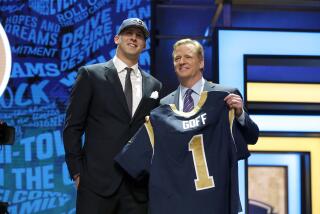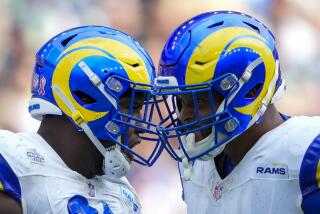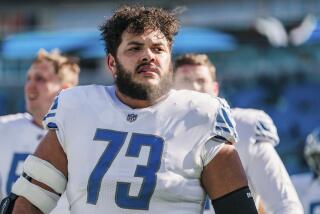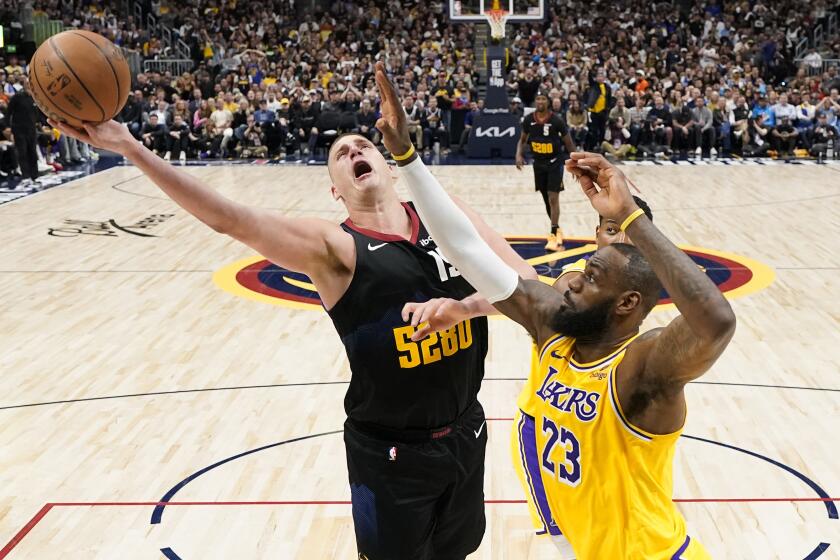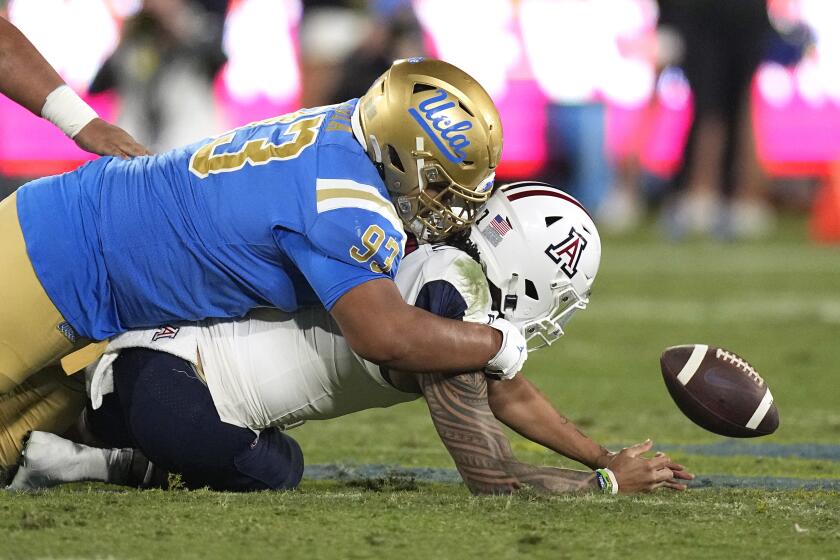NFL lockout puts rookie free agents in limbo
Passed over in the NFL draft, offensive lineman Kris O’Dowd is determined to show pro scouts he can handle a rush.
Soon, he’ll get his chance.
The former USC center, along with a few hundred other undrafted hopefuls, will wind up signing with an NFL team shortly after a new collective bargaining agreement is in place and the lockout is lifted. In a normal year, O’Dowd surely would have hooked on with a team already. But because of the lockout, there wasn’t the traditional post-draft flurry of signings, the frantic grab for rookie free agents who didn’t hear their names called over the course of seven rounds.
“For me, this lockout has been a blessing in disguise,” said O’Dowd, who has spent the last two months training in Milwaukee. “It’s been very motivating. I wasn’t really expecting that outcome on draft day, but at the same time it put my eyes on what I needed to do to improve and get better.”
With the scheduled start of some training camps less than two weeks away — and a new CBA on the horizon but not yet in place — the clock is ticking to save the preseason. That means there will be a compressed free-agent period after a deal is done, and that includes the scramble to sign first-year players who have been waiting in limbo.
“It’s going to be a feeding frenzy,” said Mike Mayock, NFL Network draft expert. “It’s ironic to me that a seventh-round draft pick is almost a throwaway, yet teams go after these free agents like crazy. Some of them get bigger bonuses than the kids who were drafted.”
There is no shortage of success stories from the ranks of the undrafted; players such as Dallas quarterback Tony Romo, Indianapolis center Jeff Saturday, Pittsburgh linebacker James Harrison, New England receiver Wes Welker, San Diego tight end Antonio Gates, two-time NFL most valuable player Kurt Warner, and last season’s rushing champion, Houston’s Arian Foster.
Mayock said that, in anticipation of the lockout and the inability to contact prospects in the immediate aftermath of the draft, many teams took special care to make connections with college players to lay the groundwork for the eventual signing period.
“There was more recruiting prior to the draft than I’ve ever seen done,” he said. “It entailed phone calls, going to see the kid, spending extra time with him on pro day, massaging him all the way up to the draft.
“It was, ‘Hey, we love you. We think you can play for us. We don’t know how the draft is going to play out, but if something crazy happens and you don’t get drafted, we’re going to be all over you.’ ”
No two NFL teams operate exactly the same way, but there are common practices when it comes to the signing of 15 to 20 rookie free agents after the draft. Among them:
•Unless it’s a highly coveted player, teams won’t wait too long for an answer. They want to know yes or no right away, and often that means a deal is off if the player wants to weigh his options.
“The agent will want to slow-play it, and we’ll pound them for an answer,” said an NFL team executive who spoke on condition of anonymity because of the sensitivity of the topic. “There’s no, ‘I’m on the other line with the Panthers, can I call you back?’ We’ll tell him, ‘No, this is a one-time thing. If you get off the phone, the offer’s off the table.’ ”
•The rookies are typically offered a two-year “split” contract, with a different set of salary numbers depending on whether they make the practice squad or 53-man roster. Whereas a top-tier rookie free agent might command a signing bonus of $20,000, someone lower down the wish list might get $2,500 or less.
•Because teams have to act so fast, they typically have scouts, front-office executives, assistant coaches and even head coaches working the phones. Some clubs even allow scouts to negotiate modest signing bonuses — something that would normally be handled by a general manager — because the scene, as one scout put it, “is like the floor of the New York Stock Exchange, with papers flying everywhere.”
•When a player verbally agrees to a deal, the team will fax him (or his agent) a contract to be signed. Only when that document is faxed back can the teams exhale, then send it to the league office to be approved.
Unlike in normal years, when teams shift immediately from the seventh round to signing undrafted players, there has been ample time this summer for people on both sides — teams and players — to evaluate where the best opportunities might be.
“The money that’s involved won’t drive the deal as much as the best fit for the player,” said agent Tom Condon, who represents the undrafted Mark Herzlich, a former Boston College linebacker likely to receive a flood of offers. “Money is always a factor, but the primary factor with all rookie free agents is, where can you go and have a legitimate chance to make the team?”
Mayock thinks there are at least five running backs who weren’t drafted but have a legitimate chance to make teams. He added he expects teams to be especially aggressive in signing players, given that they have been held back from doing so for two months. It’s time to pinpoint their needs.
“It wouldn’t surprise me if there were an assistant coach or a player-personnel staff member waiting at somebody’s house or apartment, ready to knock on the door and do a deal in person,” he said. “I wouldn’t be surprised if entire departments are sent out on the road to be waiting until 12:01 in the morning, or whenever that gun goes off.
“Nothing would surprise me this year.”
twitter.com/LATimesfarmer
More to Read
Get our high school sports newsletter
Prep Rally is devoted to the SoCal high school sports experience, bringing you scores, stories and a behind-the-scenes look at what makes prep sports so popular.
You may occasionally receive promotional content from the Los Angeles Times.
